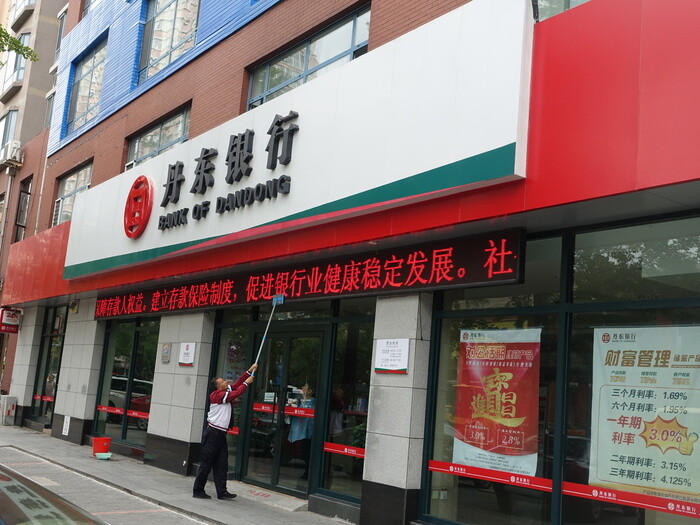hankyoreh
Links to other country sites 다른 나라 사이트 링크
Chinese banks suspending North Korean-related business activities

Reports of Chinese banks suspending North Korea-related activities are fanning speculation that a new executive order from US President Donald Trump allowing for sanctions against financial institutions in third countries may have been based on prior deliberations with Beijing.
Numerous reports point to Chinese banks indeed halting transactions with North Korean nationals in the North Korea-China border region.
“Chinese commercial banks in Dandong and the rest of the border regions have recently been notifying North Korean customers that they should withdraw all of their deposits,” a local source told the Hankyoreh.
“Apparently, this measure was taken not simply as matter of current legality, but also in consideration of what could happen going ahead,” the source said.
Another source explained, “With more and more instances where North Korea-China trade has to be done in cash because people can’t perform large transactions through their bank accounts, it’s become impossible to engage in transactions at a large scale.”
“Normal trade is not functioning,” the source added.
In connection with this, Reuters reported on Sept. 21 that the People’s Bank of China, the Chinese central bank, recently instructed commercial banks to suspend transactions related to North Korea. The agency quoted four financial industry insiders as saying the bank sent documents on Sept. 21 listing guidelines for strict enforcement of UN Security Council resolutions sanctioning the North. Its content reportedly included orders not to accept new North Korean customers and to gradually reduce the extension of loans to existing North Korean customers.
The document also explained that “management of North Korea-related business has become an issue of national-level politics and national security” and asked banks to explain to North Korean customers that they were “fulfilling our international obligations,” Reuters reported.
While the People’s Bank measures are ostensibly a call for strict enforcement of the terms of UNSC resolutions, they also come across strongly as a preliminary measure to prevent Chinese banks from being caught in separate secondary boycott measures by the US. While it did not directly reference the sanctions against North Korea, the bank sent notices to commercial banks on Sept. 11 telling them to check for and report information about individuals and businesses listed as being subject to UNSC sanctions.
“It certainly is a problem for China when talk of a secondary boycott keeps coming up from the US,” said Yanbian University professor Jin Changyi.
“China, which already senses its own need for sanctions, may have taken the measures out of concerns about potential trade frictions with the US,” Jin suggested.
Restrictions implemented by Chinese financial authorities on transactions with the North last year may also have been expanded recently. A local source said that “traders with North Korea in Dandong and the rest of the border region have been experiencing difficulties with transactions after having their foreign exchange accounts at Chinese banks frozen since last year.”
The likelihood of the Chinese government officially acknowledging the measures appears slim. As a rule, China only acknowledges sanctions reached through international agreement in the form of UNSC resolutions. It has also consistently objected to independent sanctions announced by South Korea, the US, Japan, and the US, making it diplomatically awkward to admit restrictions on financial transactions with the North that could be seen as its own form of independent sanctions.
When asked at a Sept. 22 briefing whether financial transactions with North Korea had been restricted, Chinese Foreign Ministry spokesperson Lu Kang said he could not give an answer.
“As far as I know, what you said is inconsistent with the facts,” Lu replied.
By Kim Oi-hyun, Beijing correspondent
Please direct questions or comments to [english@hani.co.kr]
Editorial・opinion
![[Column] Park Geun-hye déjà vu in Yoon Suk-yeol [Column] Park Geun-hye déjà vu in Yoon Suk-yeol](https://flexible.img.hani.co.kr/flexible/normal/500/300/imgdb/original/2024/0424/651713945113788.jpg) [Column] Park Geun-hye déjà vu in Yoon Suk-yeol
[Column] Park Geun-hye déjà vu in Yoon Suk-yeol![[Editorial] New weight of N. Korea’s nuclear threats makes dialogue all the more urgent [Editorial] New weight of N. Korea’s nuclear threats makes dialogue all the more urgent](https://flexible.img.hani.co.kr/flexible/normal/500/300/imgdb/original/2024/0424/7317139454662664.jpg) [Editorial] New weight of N. Korea’s nuclear threats makes dialogue all the more urgent
[Editorial] New weight of N. Korea’s nuclear threats makes dialogue all the more urgent- [Guest essay] The real reason Korea’s new right wants to dub Rhee a founding father
- [Column] ‘Choson’: Is it time we start referring to N. Korea in its own terms?
- [Editorial] Japan’s rewriting of history with Korea has gone too far
- [Column] The president’s questionable capacity for dialogue
- [Column] Are chaebol firms just pizza pies for families to divvy up as they please?
- [Column] Has Korea, too, crossed the Rubicon on China?
- [Correspondent’s column] In Japan’s alliance with US, echoes of its past alliances with UK
- [Editorial] Does Yoon think the Korean public is wrong?
Most viewed articles
- 1[Column] Park Geun-hye déjà vu in Yoon Suk-yeol
- 2Thursday to mark start of resignations by senior doctors amid standoff with government
- 3Kim Jong-un expressed ‘satisfaction’ with nuclear counterstrike drill directed at South
- 4[Column] ‘Choson’: Is it time we start referring to N. Korea in its own terms?
- 5N. Korean hackers breached 10 defense contractors in South for months, police say
- 6Will NewJeans end up collateral damage in internal feud at K-pop juggernaut Hybe?
- 7Why Korea shouldn’t welcome Japan’s newly beefed up defense cooperation with US
- 8[Editorial] New weight of N. Korea’s nuclear threats makes dialogue all the more urgent
- 9[Guest essay] The real reason Korea’s new right wants to dub Rhee a founding father
- 10[Column] Yoon’s first 100 days should open our eyes to pitfalls of presidential system